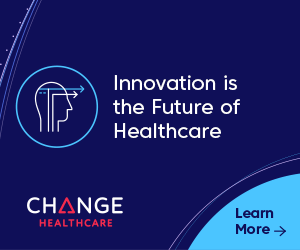
- Program Spotlight:
Last Chance to Register for Next Week’s Virtual Leadership Symposium - Healthcare’s Cybersecurity Threat
- Reminder: Special Call for Papers on Behavioral Health
- New Sessions Available in ACHE’s On-Demand Recording Library
- The Racial Differences Hidden in the Data
- Recognizing Chapters’ Diversity and Inclusion Efforts
Program Spotlight:
Last Chance to Register for Next Week’s Virtual Leadership Symposium
Although the healthcare field has made significant progress in implementing comprehensive diversity, equity and inclusion initiatives targeted toward improving patient access and outcomes, disparities persist. For example, one recent article reports that racially biased medical device results are raising patient safety concerns. Meanwhile, another article says inequities in the U.S. health system cost about $320 billion today, and could eclipse $1 trillion in annual spending by 2040 if left unaddressed.
When you attend the Virtual Leadership Symposium next week, you’ll gain actionable strategies to meet the unprecedented challenges the healthcare field is facing, including issues related to diversity, equity and inclusion. Attend the following sessions from your home, office or wherever is most convenient, and earn up to 6 ACHE Face-to-Face Education and continuing education credits:
- During “Leadership Insights: Taking Inclusive Leadership From Words to Action,” presenters Jackie Hunter, DC, senior vice president/chief diversity & inclusion officer, the University of Vermont Health Network; Thomas H. Lee, MD, CMO, Press Ganey Associates Inc.; and David Smith, PhD, associate professor of practice, Johns Hopkins Carey Business School, will identify effective approaches for building a culture of inclusivity at all levels within healthcare organizations.
- Marvin R. O’Quinn, president/COO, CommonSpirit Health; Preetha Reddy, executive vice chairperson, Apollo Hospitals Enterprise Limited; and Anne Klibanksi, MD, president/CEO, Mass General Brigham, will explore the importance of addressing health equity through a strategically global lens during “Hot Topic: A Global Approach to Health Equity.”
Take a peek at the at-a-glance agenda and learn more about the expert speakers who will share insights during the symposium, including keynote speakers Melissa Swift, U.S. transformation leader at Mercer, and Nikkia Reveillac, director of Consumer Insights at Netflix—both of whom recently appeared on the Healthcare Executive Podcast.
Check out “Transforming the Workplace” with Swift and “Leading With Curiosity” with Reveillac to get a preview of their Virtual Leadership Symposium sessions, and register today.
Healthcare’s Cybersecurity Threat
Healthcare providers face damaging cybersecurity threats. The FBI reported that more than 40 million patient records were compromised by hackers in 2021, triple the number of records compromised in 2018, according to an article in HIMSS’ Healthcare IT News.
In addition to the increase in threats, cybersecurity talent is scarce, with about 600,000 IT jobs open annually in the United States across all sectors. Less than 25% of applicants for those open positions are qualified, and the worldwide shortfall of cybersecurity professionals is about 3.5 million, according to an article in MIT Technology Review.
Three-Fold Mitigation
Effective cybersecurity risk mitigation requires decisive action on three fronts: guarding the perimeter, internal vigilance and recovery preparation.
Guarding the perimeter has been the primary focus of healthcare cybersecurity teams, with good reason: If you stop the enemy at the border, your territory is safer. Perimeter defenses may include:
- Antivirus/antimalware.
- Access controls.
- Vulnerability management.
- Endpoint detection/response.
- User education against social engineering.
Internal vigilance is necessary because no perimeter is 100% impenetrable. Insiders, such as employees, also introduce risk. Effective cybersecurity requires that companies quickly identify and neutralize threats that bypass defenses. Internal vigilance requires:
- Comprehensive, up-to-date threat intelligence.
- Monitoring technologies.
- Threat response capabilities.
Recovery preparation is needed because even with defense and vigilance, cyberattacks can occur. Providers must mitigate risk with recovery measures, including:
- Operational continuity.
- Operational playbook.
- Cyberinsurance.
- Payment contingencies.
Healthcare IT Consulting Can Help
A complex cybersecurity agenda means many providers turn to specialized partners for assistance, including virtual CISO services, assessments, expertise and more. To read an in-depth version of this article with actionable insights, please visit the Change Healthcare website.
Change Healthcare, an ACHE Premier Corporate Partner, provided the content above.
Reminder: Special Call for Papers on Behavioral Health
ACHE’s Journal of Healthcare Management and the Canadian College of Health Leaders’ Healthcare Management Forum are jointly calling for original research on topics related to behavioral health. The papers will be published in special November 2023 editions of each journal.
Authors are invited to submit a 200-word abstract to one journal or the other (but not both) by Oct. 28. Abstracts should include a short overview of the proposed manuscript, the intended audience and key messages for readers. Additional details about the abstracts and topics that will be considered can be found here.
Abstracts and questions regarding submissions to the Journal of Healthcare Management can be sent to Joe Pixler, senior editor, Professional Development, Department of Learning, at jpixler@ache.org.
New Sessions Available in ACHE’s On-Demand Recording Library
Do you need to earn ACHE Qualified Education credit to advance as a Fellow or recertify? ACHE’s On-Demand Recording Library recently added many recordings of sessions offered during our spring 2022 Virtual Leadership Symposium. Following are just a few examples of the newly added sessions you can choose from:
- “Leadership Insights: Leveraging Data to Address Social Determinants of Health.”
- “International Hospital Development: Cleveland Clinic London's Journey from Planning to Activation.”
- “Hot Topic: The Six Biggest External Factors Shaping the Future of Healthcare.”
- “Innovation Reimagined: Looking at the Road Ahead.”
- “Leveraging a Virtual Workforce to Improve Engagement and Reduce Burnout.”
Upon completion of one of these sessions, ACHE Qualified Education credits will automatically be uploaded to your My ACHE account. Learn more and purchase a recorded session today.
The Racial Differences Hidden in the Data
Although many healthcare organizations have taken steps to positively affect the communities they serve, they are still missing sufficiently detailed demographic data that captures the pervasive influence of structural racism and other marginalizing factors that affect health outcomes, according to Gayle L. Capozzalo, FACHE, and Douglas Riddle, PhD, DMin.
In a new ACHE Blog post titled “The Racial Differences Hidden in the Data,” Capozzalo, executive director of the Equity Collaborative, an initiative of the Carol Emmott Foundation, and a past ACHE Chair; and Riddle, curriculum director of the Carol Emmott Foundation, contend that “large improvements in quality, safety and outcome metrics will come for healthcare institutions only when we begin to track the impact of race, gender, sexual orientation, ethnicity, disability status and other crucial factors on those metrics.”
Visit ache.org/Blog to read the full blog post and learn more about the need to get the metrics right to bring real equity to healthcare.
Recognizing Chapters’ Diversity and Inclusion Efforts
Congratulations to the five chapters that received the 2022 Regent-at-Large Award for their accomplishments in diversity. To be eligible to receive an award, a chapter must actively demonstrate commitment to and successful execution of significant diversity and inclusion initiatives within the chapter, community and healthcare management field. The following chapters received the award during the annual Chapter Leaders Conference, which took place Sept. 19–20 in Chicago.
- District 1: Healthcare Leaders of New York.
- District 2: ACHE—North Florida Chapter.
- District 3: ACHE—MN Chapter.
- District 4: South Texas Chapter of the American College of Healthcare Executives.
- District 5: Washington Chapter of ACHE.



